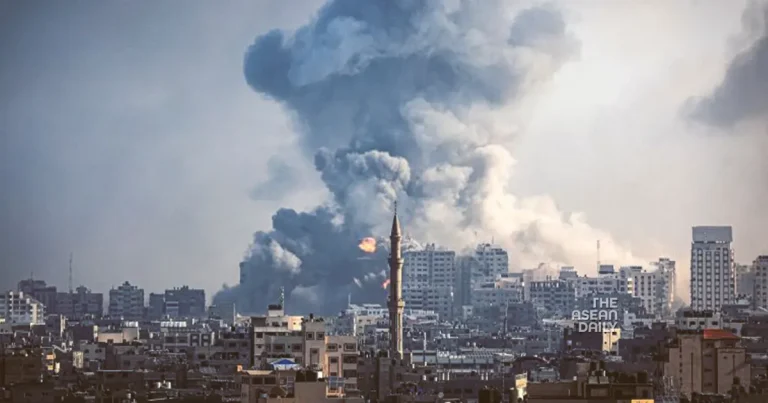22-10-2023 (RAFAH) On Saturday (Oct 21), the Israeli military announced an escalation in its bombardment of Hamas-controlled Gaza just hours after the first aid trucks arrived from Egypt to provide much-needed relief to the war-torn enclave.
The military’s stated objective is to reduce the risks faced by its troops as they prepare to enter Gaza in the next phase of the conflict, which was initiated after Hamas carried out the deadliest attack in Israel’s history on Oct 7.
According to Israeli officials, Hamas militants killed at least 1,400 people, predominantly civilians who suffered gunshot wounds, mutilation, or incineration, and took more than 200 hostages.
In response, Israel launched a relentless bombing campaign that has claimed the lives of over 4,300 Palestinians in Gaza, primarily civilians, as reported by the Hamas-run health ministry.
The Israeli siege has led to severe shortages of food, water, electricity, and fuel in the densely populated territory of 2.4 million people, prompting concerns of a looming humanitarian catastrophe.
In anticipation of an imminent ground offensive, tens of thousands of Israeli troops have been deployed to the Gaza border.
Admiral Daniel Hagari, a military spokesman, stated, “From today, we are increasing the strikes and minimising the danger. We have to enter the next phase of the war in the best conditions, not according to what anyone tells us.”
During a visit to a frontline infantry brigade, Chief of Staff Lieutenant General Herzi Halevi affirmed that the troops are prepared to counter any surprises that Hamas may have in store for them in Gaza. He stated, “Gaza is densely populated, the enemy is preparing a lot of things there – but we are also preparing for them.”
Additional Aid Arrives from Egypt
20 trucks from the Egyptian Red Crescent crossing into Gaza through the Rafah border on Saturday. Notably, this crossing is the only one not controlled by Israel, and it closed again after the aid trucks passed through.
These trucks had been waiting on the Egyptian side for several days after Israel granted permission, following a request from its main ally, the United States, to allow aid to enter Gaza.
UN Secretary-General Antonio Guterres expressed the view that the 20 trucks fell short of Gaza’s needs, stating at a peace summit in Egypt that “much more” aid is required. US Secretary of State Antony Blinken welcomed the aid and called on “all parties” to keep the Rafah crossing open.
However, a Hamas spokesman pointed out that “even dozens” of such convoys could not meet Gaza’s requirements, particularly since no fuel was being allowed in to facilitate the distribution of supplies to those in need.
Humanitarian Crisis and Displacement
More than one million Gazans have been forced to flee their homes in northern Gaza in anticipation of the impending Israeli offensive. The humanitarian situation in the region has been described as “catastrophic” by five UN agencies, including UNICEF and the WHO, who emphasized that “the world must do more.”
Peace Summit in Cairo
In Cairo, Egyptian President Abdel Fattah al-Sisi hosted a peace summit attended by regional and some Western leaders. UN Secretary-General Guterres urged action to end the ongoing crisis, calling for a “humanitarian ceasefire.” He emphasized the legitimate grievances of the Palestinian people after “56 years of occupation with no end in sight.”
While condemning Hamas attacks on Israeli civilians, Guterres also stressed that such attacks could not justify the collective punishment of the Palestinian people. The summit, however, concluded without a joint statement, highlighting differences between Arab and Western countries on how to achieve lasting peace between Israelis and Palestinians.
Western delegates sought a clear condemnation placing responsibility for the escalation on Hamas, but Arab leaders refused. Instead, the Egyptian hosts released a statement, with the approval of Arab delegates, criticizing world leaders for seeking to “manage the conflict and not end it permanently.”
Release of Hostages
A full-scale Israeli ground offensive in Gaza carries significant risks, including the fate of hostages taken by Hamas. The release of two Americans among the hostages, Judith and Natalie Raanan, offered a rare “sliver of hope,” according to Mirjana Spoljaric, President of the International Committee of the Red Cross.
US President Joe Biden expressed his gratitude to Qatar for its mediation in securing the release of the American hostages and committed to working toward the return of other Americans still in captivity.
Devastation and Escalation
The conflict has resulted in nearly half of Gaza’s residents being displaced, with at least 30% of all housing in the territory either destroyed or damaged, according to the United Nations. Meanwhile, violence has flared along Israel’s border with Lebanon, leading to casualties on both sides. In the West Bank, 84 Palestinians have been killed since Oct 7, as reported by the health ministry.
Protests in Support of Palestinians
Solidarity with Palestinians has extended beyond the region, with thousands marching in support in cities across France, Italy, Spain, and the United Kingdom, including nearly 100,000 demonstrators in London.




